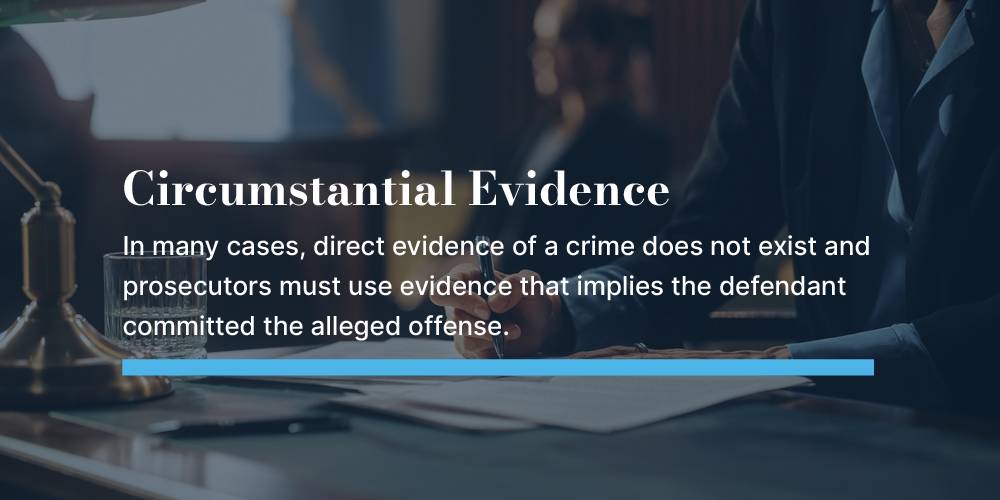Circumstantial vs. Direct Evidence in Wisconsin Criminal Cases
Being arrested and charged with a crime can be a frightening prospect. A criminal conviction has serious consequences for a person’s life, finances, career, and freedom. However, those who are facing criminal charges may not understand the laws involved in their case, the processes followed during an investigation, or their options for defense.
One aspect of criminal prosecutions that often causes confusion is the different evidence that can be used to show a person’s guilt. During a Wisconsin criminal case, it is important to understand the difference between direct evidence and circumstantial evidence so you can carefully weigh your options and decide whether to take a plea deal or go to trial.
In addition to understanding the types of evidence that may play a role in a criminal trial, those who are accused of committing crimes will also need to understand the ways that this evidence may be challenged. An experienced Milwaukee, WI criminal defense attorney can cast doubt on the validity of certain types of evidence or witness testimony, they can challenge the narrative proposed by prosecutors and, if need be, appeal a conviction on the grounds that evidence was obtained or handled improperly.
Evidence In Violent Versus White Collar Crimes
There are two types of evidence in criminal cases: direct and circumstantial. Direct and circumstantial evidence may both be used in any kind of criminal case, whether it be a white collar crime, drug crime, violent crime, or anything else.
Violent crimes are those that involve the use of violence or force, such as murder, rape, assault, and robbery. White-collar crimes are non-violent and usually involve financial deceit, fraud, and breach of trust, such as insider trading, embezzlement, and money laundering.
By their nature, violent crimes and white-collar crimes will often involve different evidence; for example, a prosecutor trying to prove that a defendant committed murder might use a gun or samples of blood found at the scene of the crime, but rely more on emails and text messages to prove an insider trading charge.
Yet the prosecution will attempt to prove the crime using both direct and circumstantial evidence, depending on what they have and on their trial strategy, constructing a story that the evidence shows the defendant is guilty – no matter how farfetched such a story may be.
What Is Direct Evidence?
Evidence that clearly demonstrates a defendant committed a crime is known as direct evidence. Direct evidence that incontrovertibly shows a person committed the alleged offense is stronger when it comes to proving guilt beyond reasonable doubt.
Examples of Direct Evidence in Violent Crimes
Murder:
-
Ballistics tests that show a bullet was fired by a specific firearm
-
The defendant’s fingerprints on a weapon used to commit murder
Rape:
-
An audio recording of a person admitting to committing the rape
-
An alleged victim’s first-hand account of the rape
Assault:
-
Eyewitness testimony that a person saw the defendant commit a crime
Battery:
-
A cell phone recording that shows the defendant hit the victim
Robbery:
-
Security camera footage shows the defendant breaking into a store and stealing items
Examples of Direct Evidence in White Collar Crimes
Insider Trading:
-
Emails from the defendant providing inside information to an outside person for the purpose of making a trade and instructing them to make the trade
-
The defendant’s computer browser history or other computer records showing they made the trades in question
Embezzlement:
-
Forged checks signed by the defendant
-
The defendant’s confession was that they embezzled the money
Money Laundering:
-
A hidden camera video recording showing the defendant receiving large amounts of cash and immediately purchasing expensive jewelry with the cash
-
Eyewitness testimony from a conspirator who saw the defendant committing all the elements of the crime
What Is Circumstantial Evidence?
In many cases, direct evidence of a crime does not exist and prosecutors must use evidence that implies the defendant committed the alleged offense. This is known as circumstantial evidence. While a single piece of circumstantial evidence may not be enough to demonstrate a person’s guilt, multiple pieces of evidence may be used together, and the prosecutor may ask the jury to "connect the dots" to determine that the defendant committed the alleged offense.
Examples of Circumstantial Evidence In Violent Crimes
Murder:
-
Eyewitness testimony that an unidentified person was seen fleeing from the scene of a crime
Rape:
-
DNA evidence from semen found in the body of the victim
Assault:
-
Harassing emails or text messages a defendant sent to a person who was later assaulted
Battery:
-
Photographs of the injuries the victim sustained
-
Security camera footage showing the defendant near the crime scene following the crime
Robbery:
-
A person’s fingerprints found at the scene of the crime alongside other people’s fingerprints
Examples of Circumstantial Evidence in White Collar Crimes
Insider Trading:
-
A person’s browser history showing how he or she searched for information about the tools used to commit the crime of which he or she is accused
Embezzlement:
-
Witness testimony that the defendant was alone in the office when the embezzlement took place
-
Financial records showing that the defendant’s bank account increased significantly during the embezzlement
Money Laundering:
-
An audio recording of the defendant stating his or her intent to commit a crime before the alleged crime actually occurred
-
Expert witness testimony of complex financial transactions
How Do Prosecutors Get Evidence?
Prosecutors use a number of different tactics to obtain evidence in a criminal case including:
-
Obtaining testimony from eyewitnesses at the crime scene
-
Hiring expert witnesses to testify
-
Utilizing physical evidence found at the scene of the crime or in the defendant’s possessions
-
Issuing subpoenas to obtain records
How Do Criminal Defense Attorneys Challenge Evidence?
Some methods that may be used to respond to evidence presented in a trial include:
Questioning Eyewitness Testimony
Many criminal cases rely on the identification of defendants by eyewitnesses. However, people's memories can be notoriously unreliable. In some cases, witnesses may be influenced by law enforcement officials who are looking to confirm their suspicions about a defendant. In others, people who had been arrested in connection with the crime in question or for other offenses may testify against someone in return for leniency. By closely examining witnesses, looking for inconsistencies in their statements, and demonstrating that they may be uncertain about what they saw, a defense attorney can poke holes in prosecutors' arguments.
Challenging Expert Opinions
Many criminal cases rely on so-called experts who can supposedly reconstruct the circumstances of a crime. However, these experts often use methods that have been found to be unreliable. A skilled attorney can question the validity of the methods used, and they may be able to show that evidence such as bite marks, blood splatter patterns, computer searches, or even fingerprints may not necessarily prove that a defendant committed the offense in question.
Challenging the Prosecution’s Timeline
The case against a defendant may rely on claims that a series of events took place that put them near the scene of the crime and indicated that they committed the alleged offense. However, disputing certain elements of this timeline may show that the events could not have occurred as suspected. For example, if a defense attorney can show that the defendant was in a different location than the prosecutor claimed, the entire narrative may not make sense.
Appealing a Conviction Based on Evidence
In addition to providing representation during a criminal trial and ensuring that all evidence against a defendant is addressed correctly, an experienced attorney can assist with appeals that address issues with how prosecutors get evidence and the improper use of evidence during a trial. In some cases, your attorney may be able to appeal a conviction on the grounds that evidence presented during a trial should have been inadmissible because it was obtained through an illegal search.
Contact a Milwaukee, WI Criminal Defense Attorney
When you are facing criminal charges, it is important to understand the evidence that could be used by the prosecution to demonstrate your guilt. To secure a conviction, prosecutors must convince a jury that you committed the alleged offense beyond reasonable doubt.
At Gimbel, Reilly, Guerin & Brown, LLP our skilled attorneys can help you understand your options for defense, including finding gaps or inconsistencies in the evidence or showing that the prosecution has not met the reasonable doubt standard. We work with our clients to explore every possible avenue for defense and build successful strategies during criminal cases of appeals. To schedule a consultation with an experienced Milwaukee, WI criminal defense lawyer, call our office at 414-271-1440.

 By:
By: 






